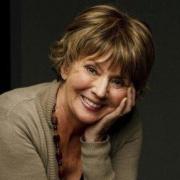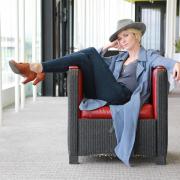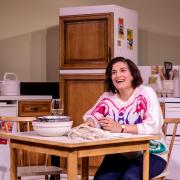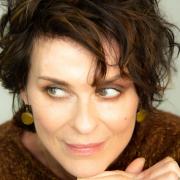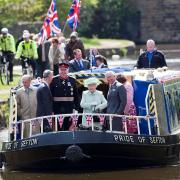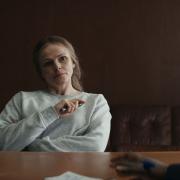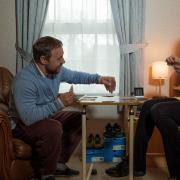According to the critics, Rochdale’s Victoria Derbyshire has avoided turning her new BBC2 programme into a freak show. She spoke to Mike Glover

IT is being a Lancashire Lass that makes news programme presenter Victoria Derbyshire who she is.
She was a multi-award winner during her 16 years on Radio Five Live and she is winning plaudits from all quarters now she has launched an ambitious new day-time television news programme on BBC Two.
But to Victoria her success is based on the characteristics she developed growing up in the north west. In an exclusive interview with Lancashire Life, she said: ‘It is a cliché, but broadly true, that people from Lancashire are friendly and open and normal and have their feet on the ground.
‘That is the tone I have had throughout my career. I haven’t changed. I am exactly the same person. It is all to do with where I was born and where I grew up.’
Victoria was born was Fairfield Hospital in Bury. She and her mum, Pauline, a primary teacher and Lancashire Life reader and her construction manager dad, Anthony, lived in Ramsbottom in her early years.
Victoria, now 46, was joined by a brother Nick, when she was two, and sister Alex, when she was four, and the family moved to Rochdale. Victoria went to Beechwood Convent Primary School, where her mum joined the staff largely made up of nuns.

It was then on to Bury Grammar School for Girls, although the boys were in a building opposite and Victoria doesn’t think the single sex education was crucial.
She enjoyed and was reasonably good at a number of subjects, including history, drama, music, sport, but was ‘not amazingly good at anything in particular.’ She wasn’t sure what she wanted to do when she came to choosing a career, although she had a vague desire to be a barrister. At Liverpool University she took English language and literature, getting involved in the university newspaper, doing reviews and interviews.
‘I didn’t feel like a job, but then I realised that you could work in radio and television as well as newspapers.’ A year in Stratford upon Avon copy writing for a public relations firm earned her enough money to take a post-graduate degree in journalism at Preston Polytechnic, now the University of Central Lancashire.
After Preston she got a job on BRMB, the commercial radio station in Birmingham, as a reporter and her career took off. ‘I was anxious every day, driving to work in a city I didn’t know, negotiating Spaghetti Junction, but I loved it. It was the time of the West Midlands Crime Squad corruption and Stephanie Slater’s kidnap. I was thrown in the deep end and it was great experience.’
She was sent to Radio Coventry to join the BBC, again as a reporter, but managed to get a job as a presenter. It was here that she was given the best advice: ‘If you have nothing to say, keep your mouth shut. You don’t have to talk just because you are on talk radio.’
After a spell back in Manchester presenting the breakfast show, she moved to Radio 5 in London in 1998, where she spent 16 years and won a series of broadcasting awards.
‘I loved the way Radio 5 was Radio 4’s cheeky sister. It suited me being informal, warm and friendly. But when there was a news break we knew how to be responsible and sensible.’
It was last year that Victoria started talking to BBC’s Director of News Louisa Compton about creating something new for TV that had the same different feel, refreshingly inclusive.
The show is called Victoria Derbyshire, which she says was not her idea, and puts a huge burden on her personally for it to succeed.
But she seems to be taking that pressure in her no-nonsense stride.
With just four reporters and ten hours of screen time to fill each week (from 9.15 to 11.15am Monday to Friday), she obviously revels in rolling up her sleeves and getting stuck in. The launch interview with two young trans-gender children was picked up by all the media and meant the programme got off to a high profile start.
It was Victoria’s gentle, non-judgemental approach to the subject which made it such a success. ‘Hopefully people will see the sort of things we are covering and the tone, and carry on watching us,’ she said.
It is this desire to connect with, and hear, everyman – or everywoman – which Victoria is passionate about.
The responsibility and the work-load don’t negate her role as a mum. She fitted in talking to Lancashire Life while whizzing home in the train in time to pick her sons, aged 8 and 11, from school. Her partner Mark Sandell is also a high-flying BBC executive.
Typically, Victoria has views about the pressure to look glamorous on television. She accepts it is still true that television makes demands on women to look good, that it doesn’t make on men.
‘It doesn’t matter to me, the way I look. If people like it fine. If they don’t, fine. I look like a 46-year-old working mother of two children. That’s because that is what I am.
‘I want people to be interested in the guests and what they have to say, not in what I am wearing, because that is so dull.’
When you hear Victoria, you can hear the breath of fresh air blowing through the corridors of the BBC. And it certainly seems to be paying dividends.
One national newspaper said of her radio style as: ‘Clear, trenchant, polite, her interviews put questions that hover on every listener’s tongue.’
Although correctly described in previews as a “new BBC2 series”, Victoria Derbyshire epitomises a new type of television that is looking through and beyond the TV set.
Shown simultaneously on a veteran terrestrial channel (BBC2) and a younger digital one (BBC News), it is also transmitted on the internet and social media. So far it has been a slow burn on terrestrial TV but the size of the digital audience has been desribed as ‘amazing’.
The show’s other hope is that – through its mixture of ‘breaking news, exclusive interviews and debates’ – it will attract audience from Jeremy Kyle, whose parade of human unhappiness forms the main competition from ITV in this time slot.
Again the national Press approves: ‘Victoria Derbyshire is aiming, like Kyle, to present extremities of human experience, although with sympathy rather than prurience: a folk-show rather than a freak-show.’
Certainly such praise won’t go to Victoria’s head. She’s still too much of a Lancashire Lass for that.




